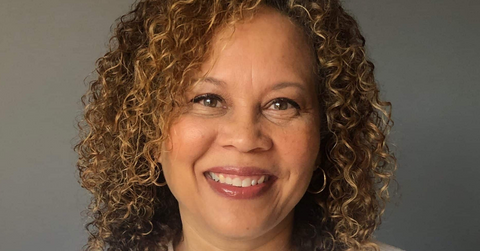Thirty-five years ago, Kelly Edwards tried to get her foot in the door of Hollywood’s billion-dollar industry in the ways she knew how: utilizing hard work and talent.
But as rejection after rejection started to roll in, Kelly realized that something else was at play when it came to landing an opportunity in Hollywood. Nepotism seemed to trump hard work and talent as the gateways to success. However, as a woman of color, she initially lacked access to the gatekeepers and support to thrive in a racially biased business.
That lack of access didn’t stop her. She landed her first TV executive gig at Fox as the minority manager of comedy development, just as she was going to put in the application to become a full-time teacher. Proof that sometimes your next yes comes just before you feel like giving up. Keep going.
Eventually, Kelly made a name for herself, helping develop legendary sitcoms including Malcolm In The Middle, Living Single, Girlfriends, The Parkers, and more.
Keeping in mind her hurdles landing a gig in the industry, she continues to unapologetically push for diversity in the entertainment business. Not only did she fight for inclusivity behind the scenes but she also demanded that Black stories be told without a monolithic perspective on-screen. And, she now proudly sets the standards while holding the door open for others to walk through.
As a Hollywood veteran, Kelly knows her worth and adds tax to it. Not only did she recently ink an HBO first-look deal, but her book The Executive Chair: A Writer’s Guide to TV Series Development is set to be released in October. After putting her on my manifestation list for 2021, Kelly was everything that I hoped she would be and more.
Her Agenda recently spoke to Kelly about filling quotas, altering the narrative of Black television, and succeeding in Hollywood.
Her Agenda: I’m not sure if you categorize yourself as one, but you are a legend! I read that you helped develop hit shows like Martin and Living Single, which are a part of the golden age of Black television. From an insider perspective, what made the 90s era of television so memorable and different from today?
Kelly Edwards: On my personal Facebook page, I breakdown pilots from past decades to start a conversation. Throughout my career, I helped develop Living Single, Girlfriends, Clueless, and The Parkers. Martin was the first show that I was an executive on, and I also helped on Moesha. The difference between development now and then is that a lot of those shows were based around talent. As an industry, we started to dip into the wealth of talent at comedy clubs, looking for the next rising star, and who has a point of view that people would want to see in a show. Martin was a product of that philosophy. We viewed television as actor driven and point of view driven, which has gone by the wayside. Now, shows are more concept driven. Also, the jokes that worked years ago, won’t work now. Things change and you have to go with the flow.
-The difference between development now and then is that a lot of those shows were based around talent. As an industry, we started to dip into the wealth of talent at comedy clubs, looking for the next rising star, and who has a point of view that people would want to see in a show. Martin was a product of that philosophy.
Her Agenda: I read that at one point, you were looking into a new career due to the nepotism in Hollywood causing a lack of jobs. As a young, Black woman trying to make it, how did you find comfortability in saying no to opportunities that did not feel right?
Kelly Edwards: Opportunities for people of color have always been restricted and limited compared to our white counterparts. I created Colour Entertainment because I noticed that when opportunities came up, my white counterpart down the hallway always got the calls even though my reputation was much better than hers. I was still the odd man out, which was lonely. I didn’t have many people to talk to outside my department and I had to seek those friendships outside my workplace because there weren’t a lot of people of color at those companies. I don’t know how many opportunities I’ve passed up but I certainly make decisions based on the environment I will be working in. I will never again work in a place with a toxic environment as I only want to work with people who have my back.
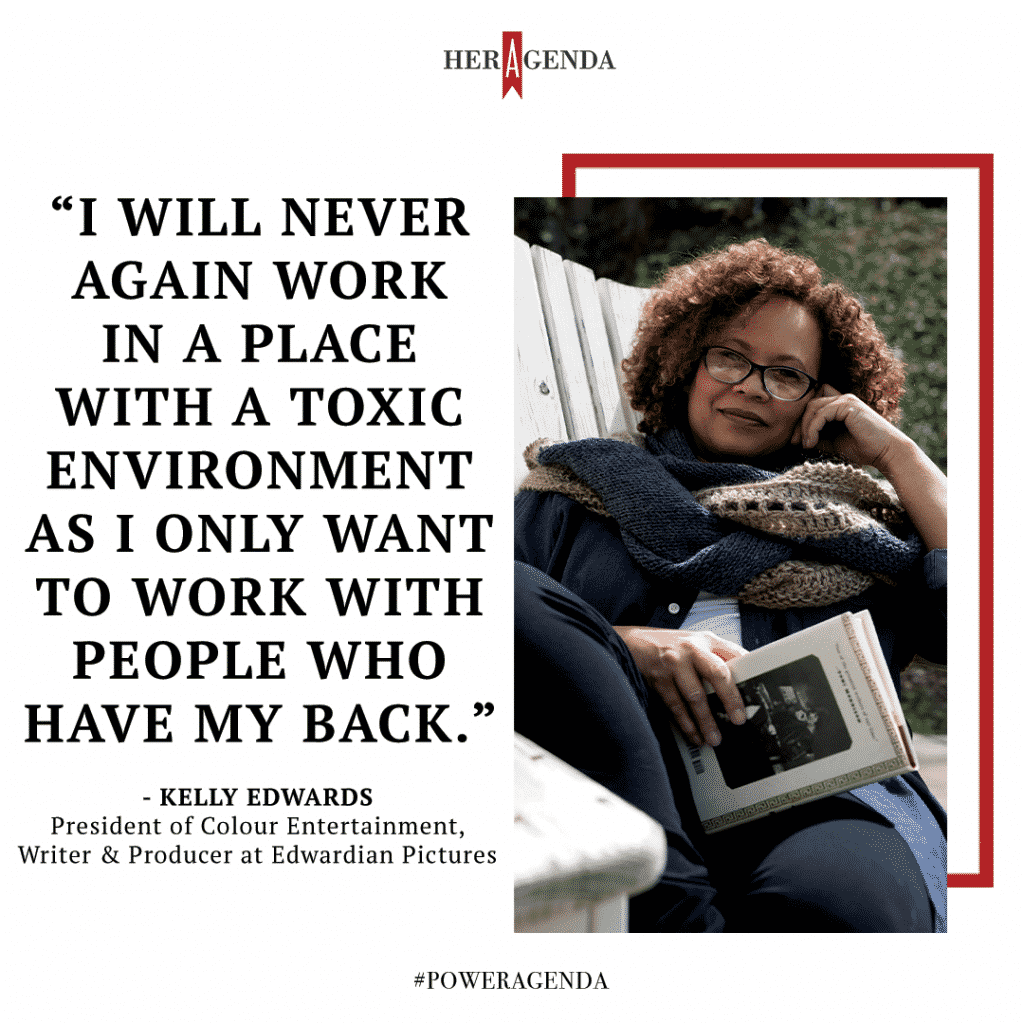
Her Agenda: Hollywood contains a small percentage of C Suite Executives across all major studios. However, you have been able to obtain one position after the other. As a woman of color, how do you get people to see you for the assets that you bring rather than filling a quota?
Kelly Edwards: Actually, I did fill a quota. My very first television job when I got to Fox was titled, ‘The Minority Manager of Comedy Development.’ That’s what they called me. And, I got in through that door but right before, I was ready to quit the business because I had interviewed at so many places. There were five positions that I interviewed for and I kept getting the response of, ‘You were our top candidate but we decided to go with someone’s relative. So, I decided that I was going to become a teacher. I really wanted to make the move into television but it was not working out. As I had the teacher application in my hand, my roommate alerted me that I had a phone call. It was from FOX and they told me I got the job. I was a minority manager, worked hard at it, and every other year I got promoted.
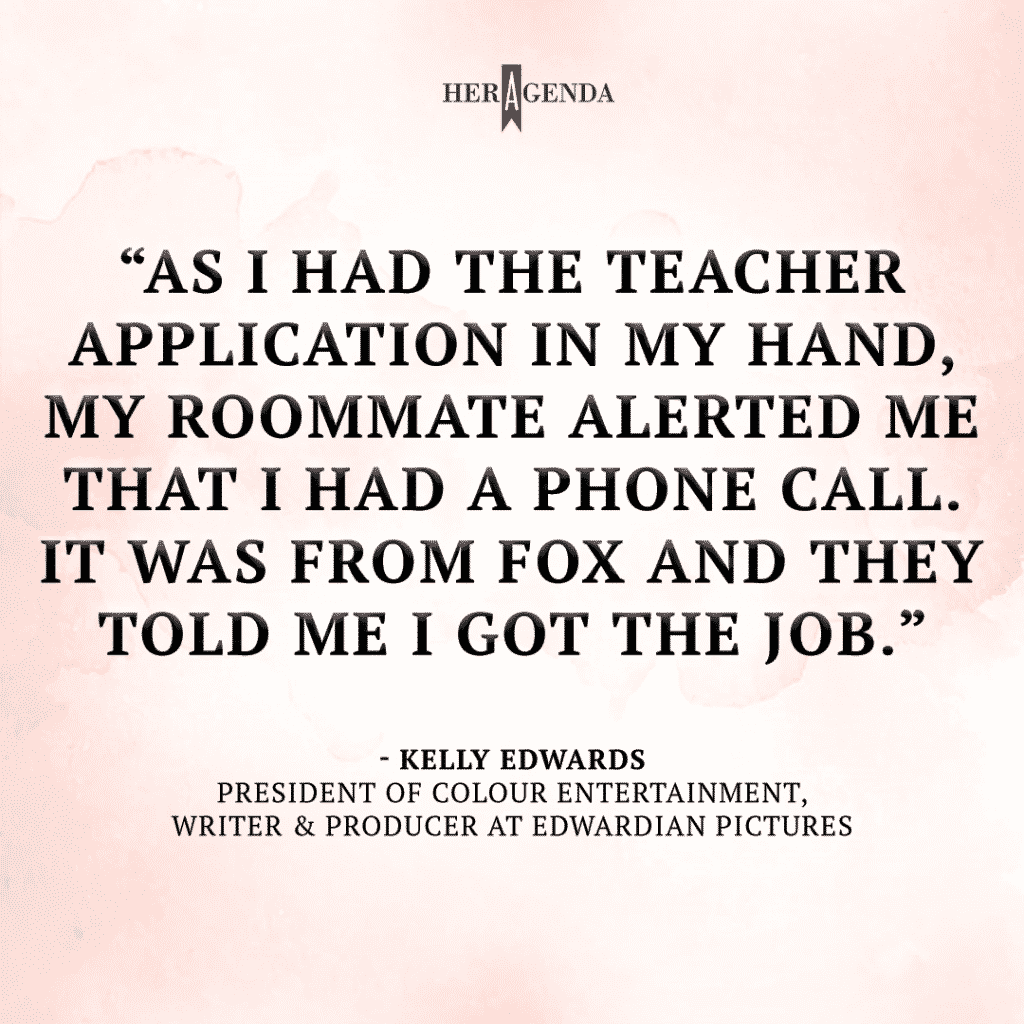
I’ve noticed that people will turn up their noses at certain opportunities or jobs. They think, ‘I shouldn’t have to do that.’ But, they forget that we have always had to do that. We were never just allowed through the door, there was always a barrier. Before writing programs began, people of color did not get staffed on shows like Frasier, Seinfeld, or Jay Leno. We were never allowed in the room in the first place, but when we do get in, we shine. We have to do whatever we need to get in there.
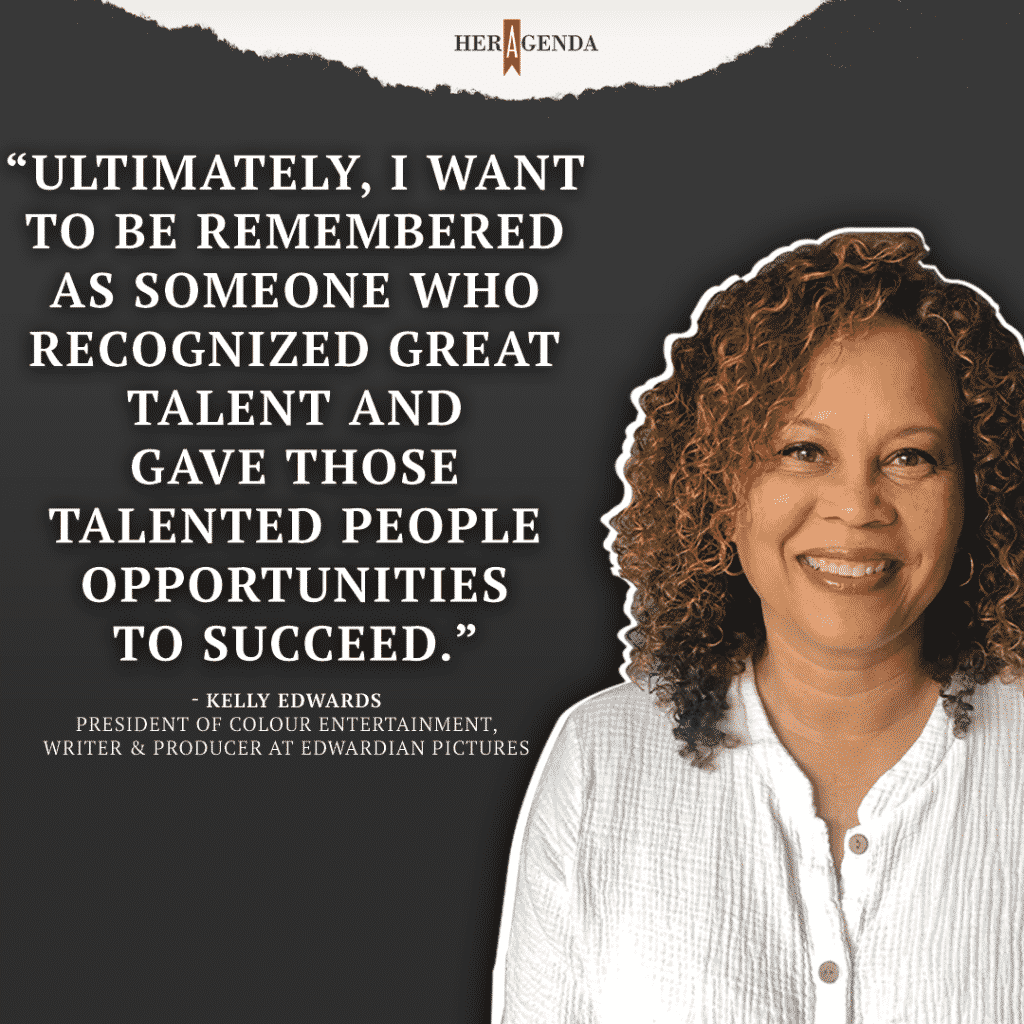
Her Agenda: Everyone knows that Hollywood is about who you know and connections. But, most people of color don’t have the advantage of networking with industry leaders. And to fix that you co-created and are now the president of Colour Entertainment. Though you pour light into younger generations, what is something that you have been able to learn from aspiring talent?
Kelly Edwards: I made this whole career change last year when I was offered a huge promotion at Warner Media, but I turned it down immediately. I knew that I was on the journey of becoming a writer. And, I started my life as a writer on July 16, 2020. Most of the support and acknowledgment that I received, came from the people that I spoke to every day. There were folks that I had inspired to live their dream, but for so long, I didn’t think that I could live my own. Seeing their work get produced, the enthusiasm that they had, and watching them manifest their dreams was such an inspiration for me. I realized that I didn’t have to be one thing or the other. I was drinking the kool-aid that claimed, once you’re something you have to be it forever. Now, we are living in a world where you can be many things at once. I learned from them that I could have confidence in my own ability.
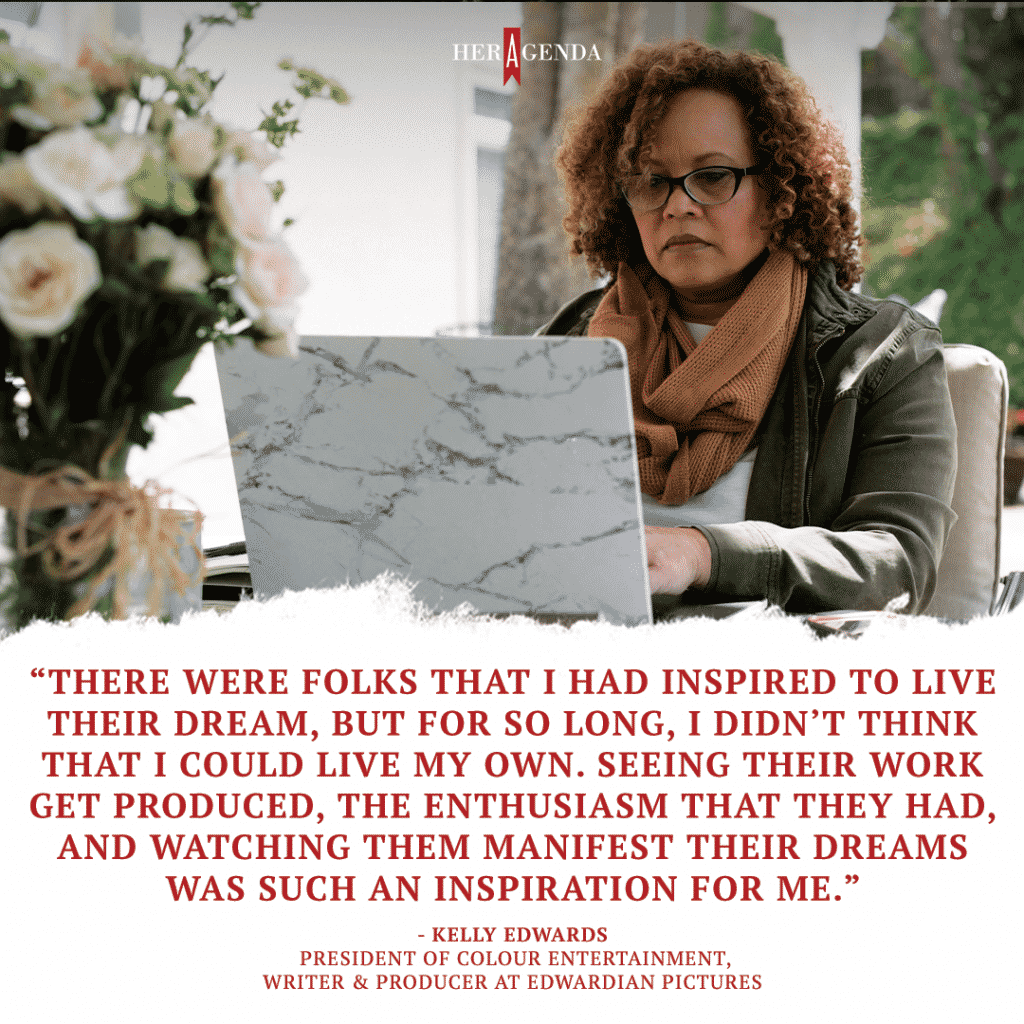
Her Agenda: I read that one of your first jobs out of college was being a writer’s assistant and last year, you inked an HBO first-look deal. Congratulations! Throughout your elevation in the creation space, how has your relationship to entertainment changed?
Kelly Edwards: It’s changed a lot in the fact that I’ve been able to sit on numerous sides in the process. I got the writer’s assistant job when I was two years into the business, but before that I was an assistant in casting. Eventually, I was able to get a well-rounded education in TV because my production experience was invaluable to being a good executive. Then, I went into working in feature film and understood the film development process. After a few assistant positions, I started my executive career at SONY. Eventually, I was running my own department which was an incredible advantage because I was determining what projects we were and were not buying. When I was head of the UPN comedy department, I vowed to never take another pitch from a white man about a Black family, nor one that starts out with, ‘This family is from the ghetto.’ There is a diaspora of Black experiences and I said, ‘We will never do another ghetto show again as long as I am at this network.’
When I went into producing, I saw everything from that perspective. The selling and pitching aspect of the business is a completely different playing field. When you are a writer or producer who doesn’t get paid until something sells, a project means everything. Your livelihood, whether or not you have insurance for your kid’s braces are incredible stressors in the process. A lot of executives don’t understand that every single pitch is someone’s livelihood on the line. Having that vantage point made me a much better executive when I went back into the executive ranks. I was also involved in corporate diversity and helped push diversity forward in innovative ways. If you think of my career as a hexagon, it certainly gives me more of a leg up than those who haven’t had such a varied background.
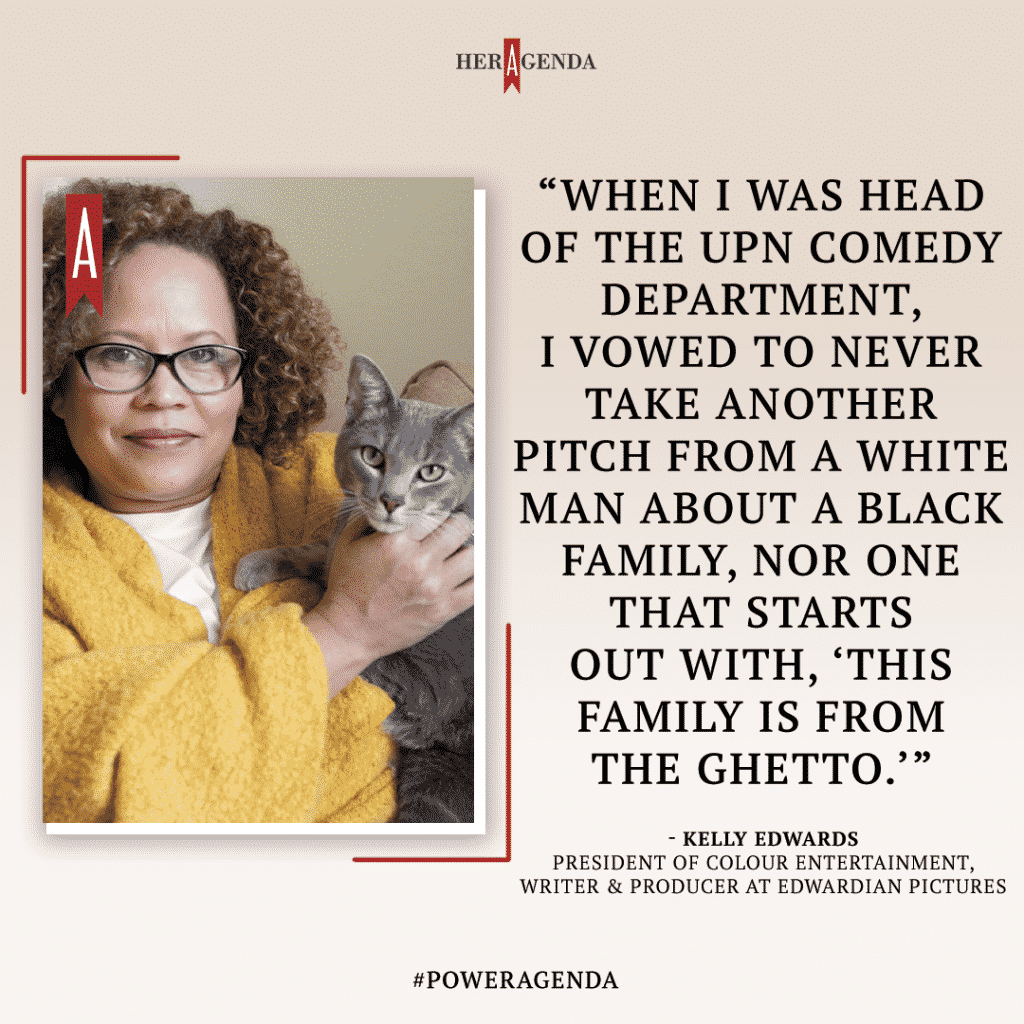
Her Agenda: In October, your book The Executive Chair: A Writer’s Guide to TV Series Development will be released. While reflecting on your life and journey in a very vain industry, what did you uncover about yourself and your journey that you may have previously ignored?
Kelly Edwards: I reconfirmed that I have a lot of information that is necessary to share. I’ve been in this business for over 35 years. I’ve always known that I was the loudest person in the room preaching about diversity. Recently, I looked through old journal entries that documented my experiences in casting sessions with certain producers and having difficult conversations. Being on the bottom of the totem pole, I don’t know where I got the sense of self to stand up to those who were more successful than I was. I knew I always had that fire, but I didn’t realize the thread it had throughout my career. As an executive, I realized that something holding me back from being a writer was thinking, ‘If I am not here in this room, who is going to fight for change as loudly I do?’
Acknowledging that I had something to say, was willing to say it, and had a history of saying it, was something that I learned through this process.
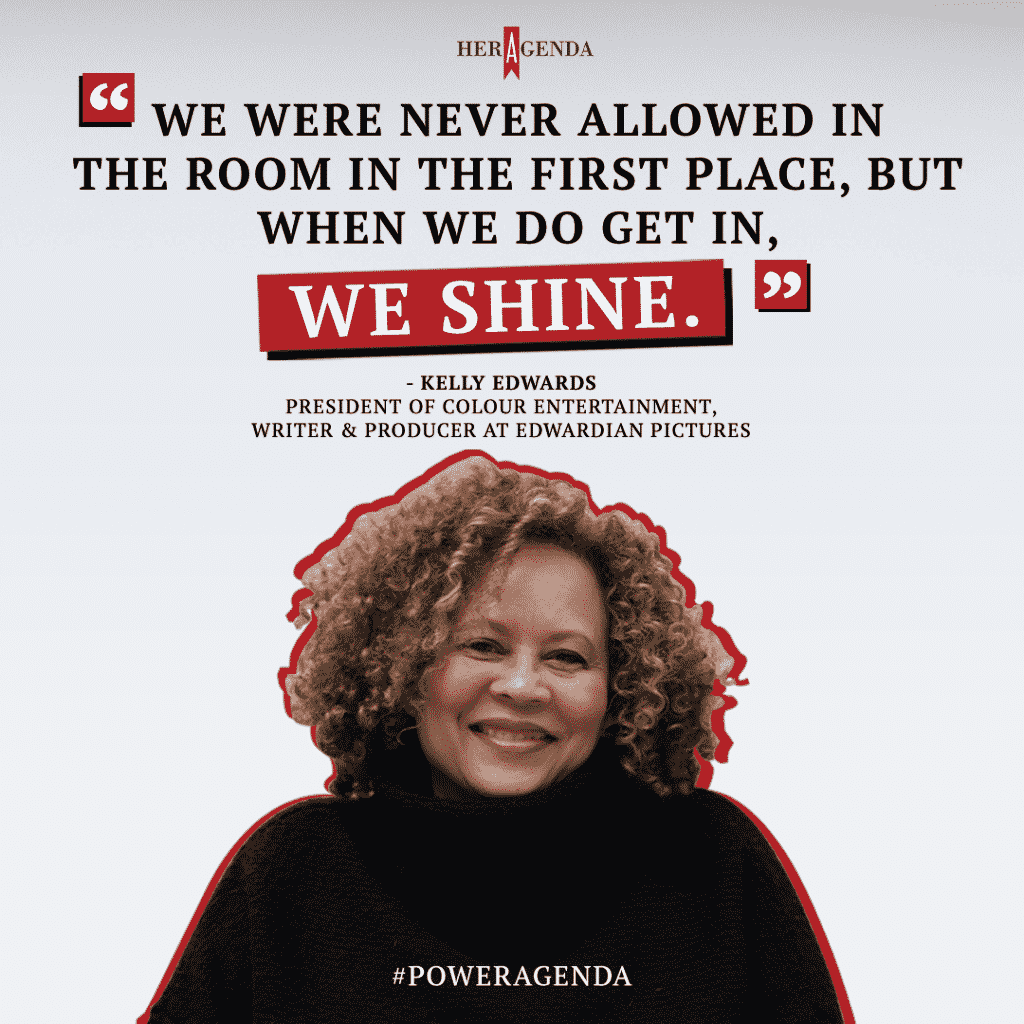
Her Agenda: In Hollywood, creatives of color are finally starting to see a shift in opportunities, and you are partially responsible for it. When you were at HBO, you spearheaded two programs including HBOAccess that helped groom tomorrow’s leaders in film and television. Without you fighting for those creators, our content would look extremely different today. Though you have helped build the legacies of many game changers, what would you like for your legacy to be?
Kelly Edwards: As the loud mouth in the room who stood up for what she believed in. I don’t want to take credit for anyone’s success because I was really just good at identifying talent. Ultimately, I want to be remembered as someone who recognized great talent and gave those talented people opportunities to succeed.
[Editor’s note: This interview has been edited for length and clarity.]

